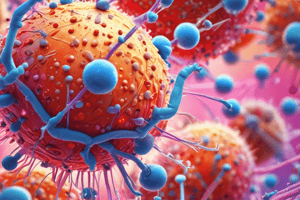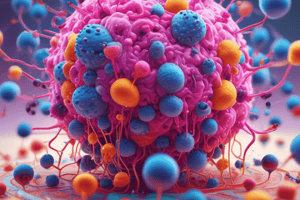Podcast
Questions and Answers
What is the primary role of antibodies in providing immunity?
What is the primary role of antibodies in providing immunity?
- To strengthen the body's physical barriers against infection.
- To identify and neutralize specific antigens. (correct)
- To stimulate the production of red blood cells.
- To directly attack and kill pathogens.
How do vaccines protect against disease?
How do vaccines protect against disease?
- By directly killing pathogens in the body.
- By stimulating the body to produce antibodies. (correct)
- By introducing antibiotics into the body.
- By providing a temporary physical barrier against pathogens.
What is the composition of a typical vaccine?
What is the composition of a typical vaccine?
- A weakened or dead form of a pathogen. (correct)
- A strong dose of antibiotics.
- A live, fully potent pathogen.
- Pre-made antibodies harvested from another person.
What is the concept of herd immunity?
What is the concept of herd immunity?
Why is it important to maintain high vaccination rates in a community?
Why is it important to maintain high vaccination rates in a community?
What is an antigen?
What is an antigen?
According to the information, what is the vaccination rate target in Australia?
According to the information, what is the vaccination rate target in Australia?
What potential side effects are associated with vaccines?
What potential side effects are associated with vaccines?
How does the body typically respond to an antigen?
How does the body typically respond to an antigen?
Besides protecting vaccinated people, who else benefits from widespread vaccination programs?
Besides protecting vaccinated people, who else benefits from widespread vaccination programs?
In the context of immunity, what distinguishes those who contract a disease from those who do not when exposed to the same pathogen?
In the context of immunity, what distinguishes those who contract a disease from those who do not when exposed to the same pathogen?
Why are booster shots sometimes recommended even after a person has completed an initial vaccination series?
Why are booster shots sometimes recommended even after a person has completed an initial vaccination series?
How did the work of Edward Jenner and Louis Pasteur contribute to the field of vaccination?
How did the work of Edward Jenner and Louis Pasteur contribute to the field of vaccination?
In cases where a community aims to achieve herd immunity, what factor most significantly contributes to its success?
In cases where a community aims to achieve herd immunity, what factor most significantly contributes to its success?
What is the most likely outcome when a person who has been vaccinated against a specific disease is later exposed to that disease?
What is the most likely outcome when a person who has been vaccinated against a specific disease is later exposed to that disease?
Which statement best describes the relationship between antigens and antibodies?
Which statement best describes the relationship between antigens and antibodies?
Why do some individuals not contract a disease when others around them do?
Why do some individuals not contract a disease when others around them do?
What is the main purpose of vaccination programs?
What is the main purpose of vaccination programs?
What are the benefits of vaccines?
What are the benefits of vaccines?
If a person is immune to a disease, what does this mean?
If a person is immune to a disease, what does this mean?
Flashcards
Immunity
Immunity
Resistance to a disease due to the presence of antibodies in the blood's plasma.
Antigen
Antigen
A protein on the surface of a pathogen that triggers an immune response.
Antibodies
Antibodies
Proteins in blood plasma that can destroy specific antigens.
Vaccination (Immunization)
Vaccination (Immunization)
Signup and view all the flashcards
Vaccine
Vaccine
Signup and view all the flashcards
Herd Immunity
Herd Immunity
Signup and view all the flashcards
Vaccine action
Vaccine action
Signup and view all the flashcards
Who herd immunity protects
Who herd immunity protects
Signup and view all the flashcards
Pioneers of vaccination
Pioneers of vaccination
Signup and view all the flashcards
Vaccine Safety
Vaccine Safety
Signup and view all the flashcards
Study Notes
- Immunity is the ability to resist disease, often due to antibodies in the blood's plasma.
- Antibodies target and destroy specific antigens, which are foreign proteins on pathogens.
- Plasma contains diverse antibodies, each combating different bacterial or viral antigens.
Helping the Body Produce Antibodies
- Some infections, like measles or typhoid fever, overwhelm the body's defenses and can be fatal.
- Edward Jenner and Louis Pasteur pioneered vaccines to protect against disease.
Vaccination
- Immunization (vaccination) makes a person resistant to infectious diseases by administering a vaccine.
- Vaccines stimulate the immune system to produce antibodies, guarding against future infections.
- Widespread vaccination programs have saved countless lives by protecting against fatal diseases.
Vaccines
- Vaccines usually contain weakened or dead pathogens that trigger antibody production with mild symptoms.
Vaccine Safety
- Vaccines may cause mild reactions like slight fever or soreness, but severe reactions are rare.
Herd Immunity
- Herd immunity arises when enough people are vaccinated to prevent disease spread, protecting the community.
- Immunizations protect unvaccinated individuals, those unable to be vaccinated, and those for whom vaccines are not fully effective.
- High vaccination rates are crucial for herd immunity; Australia aims for 95% vaccination against preventable diseases.
Studying That Suits You
Use AI to generate personalized quizzes and flashcards to suit your learning preferences.




